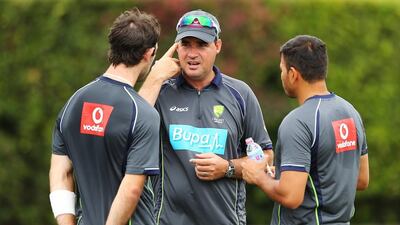Has there been a better time than now to be a coach in cricket? The thought occurred as a corollary from tracking Pakistan’s ongoing search for a new coach, the shortlist of which seems like it may really be pretty short.
Only to some degree would the thinness be down to the unattractiveness of this particular post: seven coaches, six different men in the past nine years does not scream long-term prospects to any candidate. Neither, to a foreigner, will the idea of living in Pakistan.
Read more:
• Paul Radley: Aaqib Javed confirms exit as UAE coach; remains favourite for Pakistan role
• Osman Samiuddin and Paul Radley: Aaqib Javed back in Pakistan coaching mix, likely to leave UAE in any event
• Cricket talking points: Nepal a rousing success story; Izamam the right man for Pakistan
• Osman Samiuddin on West Indies cricket: WICB and Caribbean Premier League comfy bedfellows ... for now
No, there seem to be more generic difficulties emerging in trying to find a new coach, namely: who, in this day and age, really wants to be the coach of an international side anymore?
We talk often about how Twenty20 cricket has changed the face of batting and fielding, and more dolefully contend that bowling is evolving too but in a different way. But we rarely discuss how much it is changing coaching, as a career option and in the scope of its work.
Look at somebody like Paddy Upton, who Pakistan are keen on but who is said to be more amenable to flexible consultancy role. And why would he not? Upton is already a coach of three T20 franchises, in the Indian Premier League (IPL), the Big Bash (BBL) and the Pakistan Super League (PSL).
Combined – or maybe just from the IPL alone – that probably earns him more money than several international positions might. Money is not everything of course, but look at the flexibility this arrangement affords him: work with one franchise, finish, return to South Africa, spend more time with family, then take off again and repeat the cycle.
Upton is not alone and he may actually become one of a few eventually. Across the five main T20 leagues (IPL, BBL, PSL, Caribbean Premier League and the Bangladesh Premier League) there are at least five coaches working with multiple franchises. Undoubtedly, among the assistant and specialist coaches, there must be more.
Increasingly as well, though, it feels as if the T20 format might become, if it is not already, a more fulfilling arena for a coach. It is these leagues, where the game is evolving most rapidly, that are cricket’s breeding grounds for innovation. Which serious coach would not be excited about that? Imagine how much the late Bob Woolmer would have loved them.
Take Mickey Arthur, who has coached two major international teams and is currently coach at three franchises, and who says he has had to change his coaching style completely since he took up T20 stints.
As just one specific example, he was always ahead of the curve when it came to using data analytics as an international coach. But in T20s he, like most coaches now, use them to engineer key match-ups in the course of a game, to get a specific bowler on against a specific batsman because the data shows that the batsman struggles against that kind of bowler.
“Each player at a certain time of a T20 comes into direct competition for that space of an over and we know one ball makes a difference,” he once told this reporter.
“So as much information as we can have, and if you can have your best possible player at that time because one ball could be crucial.”
It is these leagues that have allowed innovators such as Trent Woodhill, keen to go beyond accepted coaching norms for batting, to come to the forefront of coaching.
In most cases, coaches are also able to exercise greater control at these franchises, unbound by wheezing, bureaucratic national boards chained to the old ideas of old men.
Here a coach can really put together a team, by getting involved in drafts or auctions, and picking the best available players from around the world. Arthur reckons the next strategy for coaches may be to identify a core of international players that they try to pick for whatever franchise they work at; that lessens the impact of not being able to delve as deeply into a knowledge of local players because no league lasts long enough to enable that.
What they lose is that more intense coach-player equation and the satisfaction of overseeing the personal development of a player: an international position still affords you time to submerge yourself into the project of making a player.
Incidentally, Arthur is also on Pakistan’s shortlist and he still believes that coaching an international side holds a sufficient degree of prestige to attract coaches. He may be right but surely not for much longer.
Follow us on Twitter @NatSportUAE
Like us on Facebook at facebook.com/TheNationalSport

